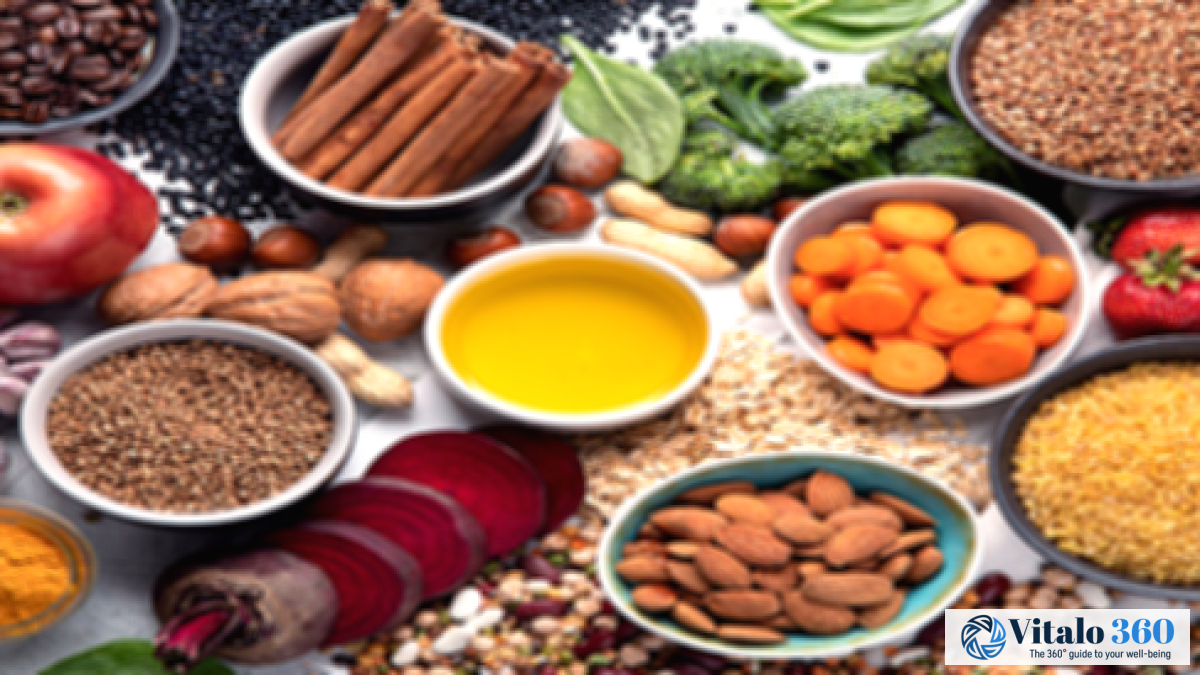.
With Ramadan bringing changes to our eating habits, are you looking for ways to support your liver? What are some good foods to focus on? We’ll dive into how certain foods can help your liver detox during Ramadan.
- Foods That Help Detox Your Liver During Ramadan
- What Does The Liver Need Most During Fasting?
- Key takeaways
- FAQ, Myth & Facts
During the blessed month of Ramadan, we often put extra pressure on our livers due to changes in our eating patterns and, um, sometimes less-than-healthy choices during iftar and suhoor. This can definitely make your liver work harder.
So, let’s explore some foods that can assist in cleansing your liver from toxins during Ramadan, shall we?
Foods That Help Detox Your Liver During Ramadan
Here are some crucial foods to incorporate into your diet throughout Ramadan to boost liver health and aid in eliminating accumulated toxins:
1. Foods Rich in Complex Carbohydrates
Eating foods high in complex carbs is super beneficial for those fasting long hours during Ramadan because:
- They provide the body with energy, essential for long fasting periods because, let’s face it, you need the energy.
- Complex carbohydrates are important for those with fatty liver disease, aiding in enhancing liver health and avoiding complications.
- Great sources of carbs are options like: oats, whole wheat, quinoa, brown rice, legumes, lentils and barley.
2. Foods Rich in Fiber
Fiber is your friend! Among the foods that help detox your liver from toxins during Ramadan, fiber-rich foods stand out because:
- Fiber helps improve digestive function, which can be sluggish during the hours when we are breaking fast.
- Fiber assists the body in producing glutathione, crucial for liver detoxification processes because it protects cells from damage, helping to eliminate toxins and free radicals effectively. It boosts the immune system’s performance too.
- Fiber supports polyphenols, a type of antioxidant that reduces harmful cholesterol and fats in the blood, minimizing the risk of fatty liver disease, often associated with weight gain and elevated cholesterol levels.
- Doctors recommend consuming foods high in fiber, such as fruits, dark green vegetables, especially leafy greens, whole wheat, and legumes.
3. Green Vegetables
Green vegetables are amazing at filtering harmful substances from the bloodstream and support liver health; making them a great choice among the foods that help detox your liver during Ramadan. Here’s why:
- They have a new supply of chlorophyll, which is great at fighting off those pesky heavy metals, chemicals, and pollutants.
- Spinach and arugula are especially good, and they help scrub away the excess waste floating around in your blood preventing it from reaching different parts of your body, so, you know, the usual good stuff.
- Some veggies, like Brussels sprouts, broccoli, garlic, and kale, are essential sources of amino acids, which support liver function and assist in detoxifying the liver from toxins.
4. Carrots
Carrots are loaded with beta-carotene and flavonoids—natural compounds especially good for enhancing liver functions and benefits.
Beta-carotene is a natural antioxidant that prevents cell damage and protects the body from toxins, which can damage cells and increase the risk of chronic diseases. So, it’s kinda important for keeping your liver healthy and working well.
Flavonoids are also used as antioxidants and aid in protecting the liver, particularly, from conditions like fatty liver disease. Um, these can really give you a boost!
5. Cabbage
Cabbage, a type of cruciferous vegetable that contains a compound called glucosinolates, helps the liver produce enzymes vital for eliminating toxins from the body. This is why cabbage is one of the foods that help detox your liver during Ramadan.
Glucosinolates, are plant-based nutrients that help prevent the accumulation of certain carcinogenic and harmful substances and therefore, helps you make those enzymes that are super important for getting rid of toxins, y’know, the ones floating around in your liver.
6. Apples
Apples? Yep! Apples are among the foods that help detox your liver during Ramadan because:
- They contain high levels of pectin, a chemical compound essential for the body to purify and cleanse the liver from toxins, thereby aiding in its proper function.
- This fruit contains malic acid, which helps lower cholesterol levels in the blood and alleviates some of the strain on the liver resulting from fat accumulation, maintaining its vitality with nutrients necessary for the body.
Beyond these dietary choices, it’s also worth considering additional supportive measures. While the original article focuses on food, exploring the role of supplements like milk thistle or dandelion root, known for their liver-supporting properties, can also be useful to add to your Ramadan routine. Always check with a healthcare professional before starting any new supplement regimen.
What Does The Liver Need Most During Fasting?
The liver is the largest internal organ in the human body, with two key functions: let’s take a look at them in detail:
Firstly, it needs the necessary energy to perform its functions through various biochemical processes for glucose, cholesterol, and protein production. It converts glucose into glycogen, which is stored in the muscles and liver for energy during fasting, and in the heart.
During fasting or exercise, glycogen is converted back into glucose to provide energy for bodily functions. Consequently, the body’s glycogen stores become the primary source of energy.
Secondly, the liver needs to eliminate toxins and wastes that enter our bodies through the bloodstream from the foods and beverages we consume. This becomes more important during fasting, where its work in filtering toxins and harmful substances that enter our bodies regularly through food is amplified; therefore, one must focus on eating foods that help detox your liver during Ramadan.
Key takeaways
- Focus on incorporating fiber-rich foods into your suhoor and iftar meals to support digestion and the liver’s detox processes during Ramadan.
- Include green leafy vegetables and cruciferous veggies (like broccoli and cabbage) to boost chlorophyll and glucosinolates, compounds that aid in toxin removal.
- Eat apples to gain pectin and malic acid, which help lower cholesterol levels and cleanse the liver.
FAQ, Myth & Facts
Is it really possible to “detox” my liver with food?
Okay, so, the term “detox” gets thrown around a lot. While your liver is a natural detoxifier, certain foods can support its function. It’s more about helping it do its job well than some magic cleanse.
Can I eat anything I want as long as I eat these “detox” foods?
Not quite, sorry! A balanced diet is still key. Overloading on fried foods then expecting carrots to save the day isn’t realistic. It’s all about balance.
Are liver detox supplements necessary during Ramadan?
Supplements? Always chat with a healthcare pro first, especially during Ramadan. They can interfere with meds or existing conditions. A good diet usually does the trick.
Can intermittent fasting during Ramadan harm my liver?
For most healthy individuals, no. Actually, it might even offer benefits. But, if you have existing liver issues, get some medical advice before fasting.
Is it true that coffee is good for the liver?
You know, some studies suggest that coffee *might* have liver-protective effects. But, more research is needed. So, don’t start chugging pots of coffee just for your liver, okay?
One person noted that “I used to feel so sluggish and bloated during Ramadan, but focusing on these foods has made a huge difference. I have more energy and feel lighter.”
Another shared, “I was worried about my cholesterol during Ramadan. Adding more apples and greens to my diet has helped me manage it better, according to my doctor.”
A third person mentioned, “Ramadan used to be a time when I’d gain weight, but now I’m more mindful of what I eat. I’m choosing more liver-friendly foods, and I feel so much better overall.
Thinking about this, it’s about making informed choices, right? It isn’t about restriction as much as about giving your body what it needs to function at its best, especially during a demanding time like Ramadan. Now, I feel more equipped to make those decisions.










